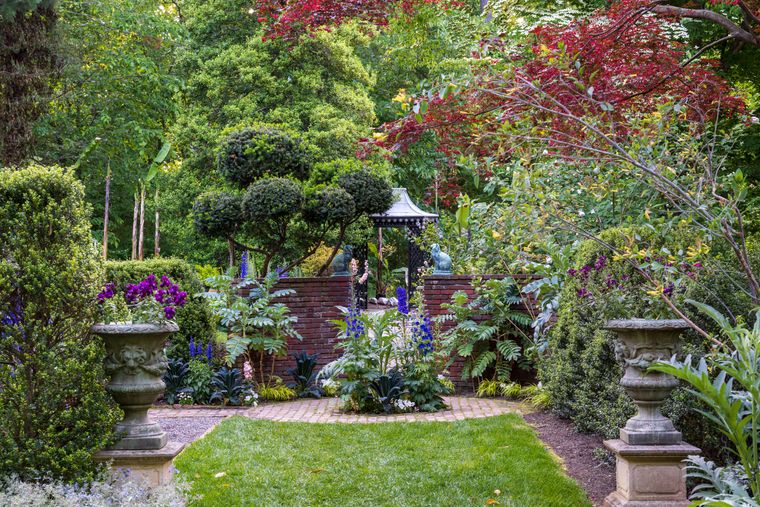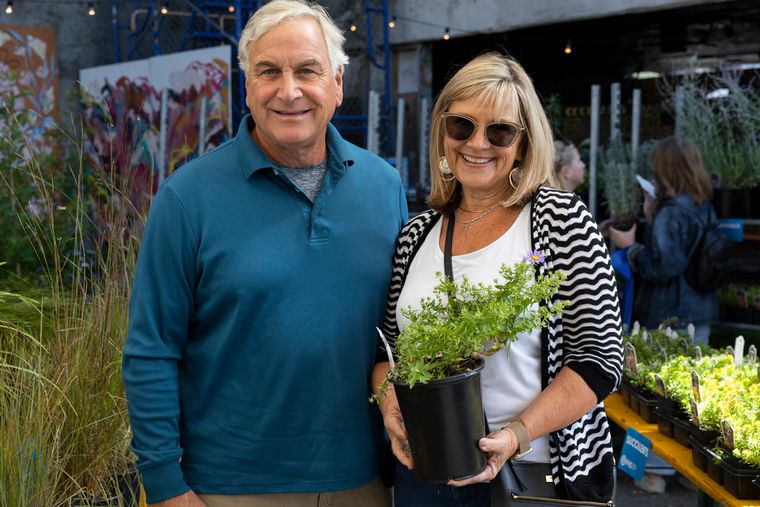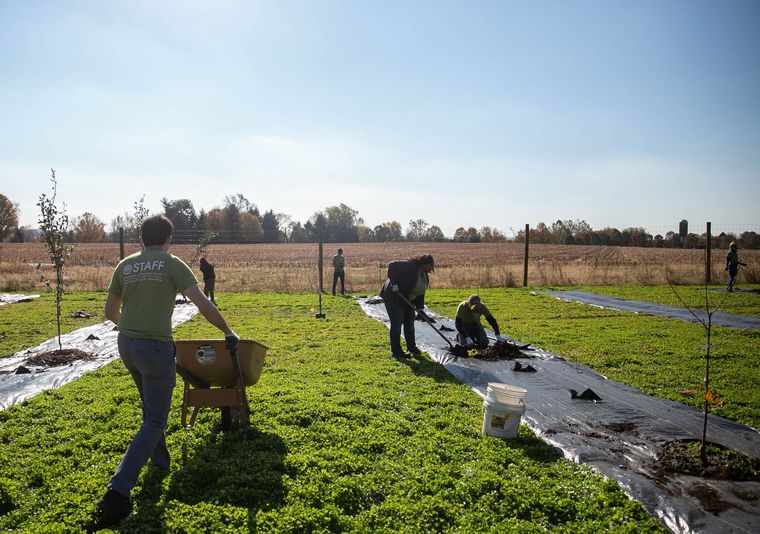



15 Common Houseplants Perfect for Your Home
plant care

By Andrew Bunting, PHS VP of Horticulture
Houseplants are more than just decorative elements; they are natural purifiers that can improve air quality and reduce stress levels. With their increasing popularity, it can be overwhelming to choose the right plant for your home. Below are 15 popular houseplants that add low-maintenance beauty to your home.
Deepen your plant knowledge. Sign up for monthly Know to Grow webinars for more gardening tips!

1. Fiddleleaf Fig (Ficus lyrata)
This plant features large, glossy leaves, making a bold statement in any room. Despite its impressive size, the fiddleleaf fig is surprisingly low-maintenance, thriving in bright, indirect light and well-drained soil. Like many “architectural” house plants, it is great for home décor and makes a strong decorative impact. It is a durable houseplant that thrives when soil is kept slightly dry, and it can reach 10’ x 6’ in the home.
Not suitable for homes with pets.

2. Snake Plant (Dracaena trifasciata)
Known for its upright sword-like leaves, the snake plant is a popular choice for beginners. It requires minimal care, tolerates low light conditions, and infrequent watering, making it ideal for busy homeowners. Depending on the cultivar the leaves can be green, white/green or yellow/green. A snake plant can reach a height and width of 4’ x 2’ at maturity in the house.
Not suitable for homes with cats.

3. Spider Plant (Chlorophytum comosum)
This easy-to-grow plant features cascading green and white leaves. Long arching stems develop with small plants that have a spider-like appearance. It adapts to various light conditions, from bright indirect light to shade, and prefers humid environments. It can reach 2’ x 4’ at maturity in the home.
This plant is pet friendly and safe for both cats and dogs.

4. Monstera (Monstera deliciosa)
Also known as the Swiss cheese plant, the monstera is prized for its large, heart-shaped leaves with unique gaps and splits. It comes in various variegated options and thrives in moderate light with well-drained soil. Monstera was featured in many Matisse paintings and has continued its popularity over the decades. It is a versatile houseplant used for home decorations and can reach 6-10' x 6’ at maturity in the home.
Not suitable for homes with pets.

5. ZZ Plant (Zamioculcas zamiifolia)
The ZZ plant has gained popularity in recent years due to its low-maintenance requirements. It is a clump-forming house plant with upright stems with many attractive, glossy leaves. ‘Black Raven’ ZZ plant is one of the black-foliaged cultivars that is highly coveted. It tolerates a wide range of light conditions, from bright sun to shade. A ZZ plant can reach 3-5’ x 2-3’ at maturity in the house.
Not suitable for homes with cats.

6. Pothos (Epipremnum aureum)
This has been a popular house plant for decades. It is one of the most durable of all houseplants requiring minimal care. It is a great houseplant for beginners. The pothos is known for its trailing vines that can climb or cascade. The leaves are heart-shaped and can be green or variegated with white or yellow. It requires minimal care, preferring low light and well-drained soil.
Not suitable for homes with cats.

7. Tree Philodendron (Philodendron selloum)
The philodendron has very large leaves with very lobed and incised leaves which are a dark glossy green. This large-foliaged house plant has gained in popularity due to its impact on complimenting home décor. It can tolerate low-light conditions. ‘Shangri-La’ is a new selection which has very textural leaves. It can tolerate bright indirect light to low light conditions. A warm and humid room will result in luxuriant growth.
Not suitable for homes with pets.

8. Jade Plant (Crassula ovata)
A popular succulent, the jade plant has thick, oval leaves and a shrub-like appearance. It requires minimal watering and thrives in bright, direct sunlight. This has been a popular houseplant for over 60 years. Because it is a succulent, it requires very little care to be a very successful houseplant.
Not suitable for homes with cats.

9. Rubber Plant (Ficus elastica)
A classic houseplant, the rubber plant features large, glossy, leathery leaves and can grow quite tall. It adapts to varying light conditions, making it a versatile choice for any room. This old-fashioned houseplant has stood the test of time. It also makes a great architectural statement in the home.
Not suitable for homes with cats.

10. Prayer Plant, Zebra Plant (Calathea sp.)
Known for their decorative foliage with intricate patterns, prayer plants come in a wide variety. They prefer indirect light, high humidity, and well-drained soil rich in organic matter. Depending on the cultivar or species they can vary from very diminutive, 6” x 6” to up to 4-5’ tall.
This plant is pet friendly and safe for both cats and dogs.

11. Air Plant (Tillandsia sp.)
These unique plants have no roots and absorb moisture from the air. Air plants come in various shapes, sizes, and colors and thrive in bright, indirect light with high humidity, like bathrooms or indoor pools. They don’t need traditional watering but will benefit from occasional misting once a week, or can be completely immersed in water for a few minutes to absorb water.
This plant is pet friendly and safe for both cats and dogs.

12. Peace Lily (Spathiphyllum sp.)
This elegant plant features white flowers amidst dark green foliage. It prefers indirect light and thrives in moist, well-drained soil. The peace lily has been especially popular in office buildings and malls, but increasingly has become a stalwart houseplant due to its durability. It needs indirect to low light conditions, and should dry out completely between waterings.
Not suitable for homes with cats.

13. String-of-Pearls (Senecio rowleyanus)
A succulent with cascading stems of orb-like leaves resembling pearls, the string-of-pearls is a unique and low-maintenance houseplant. It requires full sun and well-drained soil, such as a cactus mix.
Not suitable for homes with pets.

14. African Violet (Saintpaulia ionantha)
African violets are known for their vibrant flowers in various colors of white, pink, purple, etc. They require special care, including watering from below and indirect light, but reward you with beautiful flowers throughout the year.
This plant is pet friendly and safe for both cats and dogs.

15. Chinese Evergreen (Aglaonema modestum)
This lush plant features heart-shaped leaves with variegated patterns in shades of green, silver, white, and pink. It tolerates low light conditions and prefers moist, well-drained soil.
In conclusion, with a vast array of options available, there's a perfect houseplant for everyone. Whether you're a seasoned plant parent or a beginner, consider factors like light availability, watering needs, and desired aesthetics to select the best plant to add life and character to your indoor space.
Not suitable for homes with pets.
Want to learn more? Subscribe to PHS's monthly newsletter for more gardening tips and stories.


